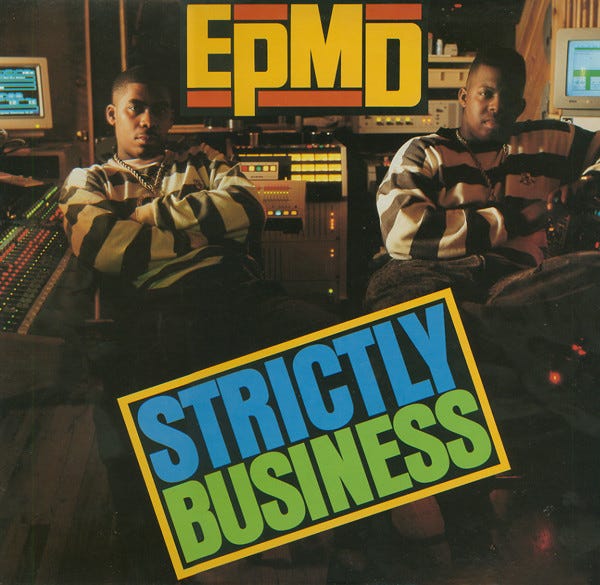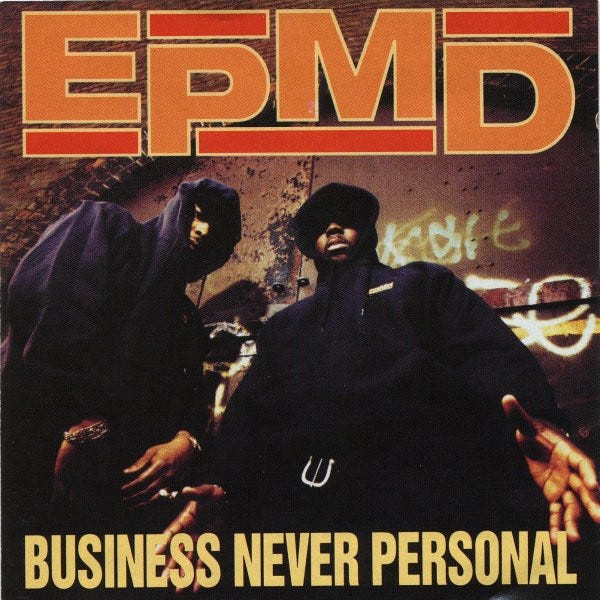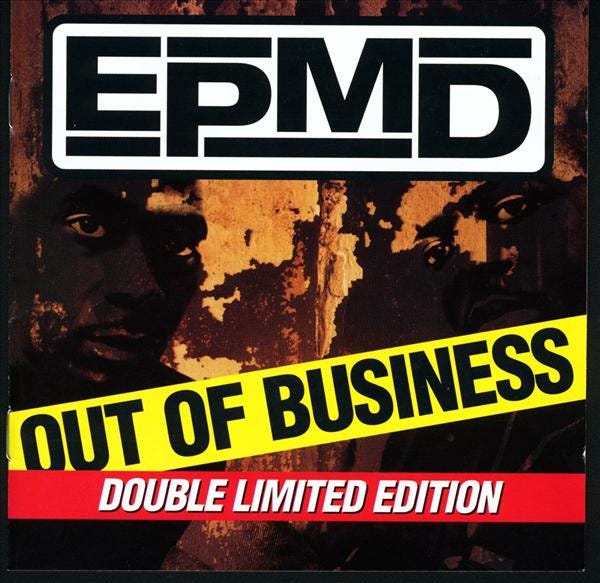I don’t hear a peep about EPMD—an acronym made up of the duo’s two members Erick (Semon) and Parrish (Smith) Making Dollars—anymore from any corner in the internet, which is partially to do with hip-hop’s fascination with the present (the current as a form of currency, shall we say), but they’re also ‘less distinct’ compared to so many other, still-remembered acts from the late-80s. There’s plenty still being written about debut album Strictly Business—and rightly so!—but very little for their six albums after that, although the Rolling Stone Album Guide (2004) does a good job of summing up their careers up until that point (i.e. sans We Mean Business) while Xgau basically called it quits after Business As Usual (“How many dope beats does the world need?”), so I drummed this up on the quick.
I think the problem with EPMD is that they weren’t a distinct voice, or even made up of distinct voices (as in, I have trouble telling the two apart). Even in the microcosm of 1988, the year their debut dropped, they had to contend with Big Daddy Kane and Eric B. & Rakim defining and then perfecting speed and flow on Long Live the Kane and Follow the Leader, N.W.A.’s Straight Outta Compton, Public Enemy’s It Takes A Nation Of Millions To Hold Us Back and Slick Rick’s The Great Adventures Of Slick Rick. (Lot of classics… and then that Slick Rick album.)
As rappers, Erick Sermon and Parrish Smith aren’t comparable to Kane or Rakim on the microphone, nor do they exude a ‘force of nature’ akin to Ice Cube or Chuck D. And they embarrass themselves when they try to tell a story in a verse. Moreover, as the years went on, both were prone to corny one-liners: “No missions impossible ask Tom Cruise,” “I transform like Spawn,” “I take action, like film crews.” (Typically speaking, if Erick Sermon is setting up a simile, you bet your ass it’s gonna land with a thud.) So in the void of anything particularly commanding about either of them, they just rode the groove with a slow flow and were hip-hop’s friendlist group until they were outclassed by De La Soul and they stopped being so friendly.
Here’s the guide:
Erick Sermon and Parrish Smith were both born in 1968, which makes them 19 at the time they were making Strictly Business, and despite their youth and despite a lack of technical know-how (at the time of making debut single “It’s My Thing,” Sermon admitted in an interview that he had no idea what a sampler or a producer was; “[w]e didn't know what a producer was. We thought everyone on the radio made their own records. We thought every record you heard on the radio was made by that artist”), they learned quick and made an incredible-sounding and fresh record. I also respect that Sermon made a point not to rely on the usual time-tested funk/soul samples (“While the world was sampling James Brown, we was over here venturing out on something that was other. We sampled some other type of shit”), even if that only basically amounts to one Eric Clapton sample on this record, it still yielded them a great hook even if they had to paid for it later. Still, the Otis Redding and Aretha Franklin samples go a long way.
Of the two rappers, I’d call Sermon the stronger one. On “Strictly Business,” Smith drops this line which doesn’t make any sense (since a pulse rate is a heart rate), “Pulse rate descends, heart rate increases,” and then proclaims the most unfortunate “I'm as deadly as AIDS when it's time to rock a party.” Meanwhile, Sermon is more willing to go out on a limb, including testing out some internal rhymes, the best being, “When I roll, I stroll; cool, always pack a tool / Just in case a brother acts a fool.” Earlier on “Strictly Business,” Sermon goes, “To make you wiggle and jiggle, like gelatin,” which is a pretty silly line in isolation, but it’s the fact that he reached to rhyme ‘gelatin’ with the preceding ‘master plan,’ and then proceeds to use that ‘-tin’ sound to link it with the forthcoming “Just think while I sink.”
The album is front-loaded, sure, although hip-hop historians will like the fact that DJ Premier took the drums off “You’re a Customer” for “Mass Appeal” and MF DOOM nabbed a single line from the deadly-dull closer “Jane” for “Hoe Cakes” (“Jane” even has a skit about how the record was about to end but then they wanted to make a song about some ex which ended up being a thread throughout each of their albums moving forward). That said, “The Steve Martin” is the best song on the second side and not to be missed, a hooky little thing thanks to the indelible Otis Redding horn sample. As for the other two songs there, “Get Off the Bandwagon” is the only song here which has ‘aged poorly’ thanks to its electro beat that probably didn’t even sound good in 1988, and then “D.J. K La Boss” lets the scratcher with the same name go at it for 4 minutes (enthralling for the first few times you hear it).
In the grand scheme of all those hip-hop albums from 1988 that I listed, I rank this fourth, for the record.
Unfinished Business (1989) is a sophomore slump, which I attribute to the fact that there seems to be less fire beneath their feet now that they’ve made it. Hey, it happens to rappers. And while they got a surprisingly large amount of mileage for the business puns in their album titles (this album, Business as Usual and Back in Business being their best titles for the context they came in), they perhaps also inadvertently revealed an unwillingness to break away from what became a formula.
As mentioned, 1989 saw breakthroughs in sampling elsewhere in the east coast but EPMD are content to churn out another Strictly Business. Okay, yes, there is something new in “You Had Too Much to Drink,” but that’s also the worst track on the album, a weird mix of house keyboard chords and rap-rock blistering guitar but with a Good Message (don’t drink and drive). Elsewhere, Smith continues his AIDS streak (weird line, I know) on “Who’s Booty”: “I had to cover my nose, not to ruin the mood / Because I knew I wasn't fishing but I smelled seafood / Smelled like shrimp or lobster, or tuna of the sea / And it wasn't worth catching the A to I to D to the S oh yes / The S is for safe sex,” which is just unfortunate all around. (Shame because the parts that lead up to it about how he’s the microphone doctor are funny.) The only truly great song of the bunch is “Please Listen To My Demo” with its eerie sample and humbling storytelling (as opposed to storytelling about women), and they get a point for sampling David Bowie for the closer.
Sermon’s beats on Business as Usual (1990) are denser; there’s more to sink your teeth into, but it also marks the beginning of EPMD’s far less interesting turn towards being ‘hard’ above all else; the titles of the opening salvo go like this: “I’m Mad,” “Hardcore,” “Rampage,” “Manslaughter,” and all this culminates in the fifth song, where they beat and rape a trans person for the simple fact that they were a trans person. EPMD will have a lot of bad songs moving forward, but it’s hard to think of any that are as morally repulsive as “Jane 3.” Hard to think of any song as morally repulsive. (Worth noting is that they also compare themselves to Bruce Jenner while doing all this.) In this context, do I feel sorry that RZA took the sample for “Brother not a Jock” and turned it into a better beat for “Daytona 500?” Fuck no.
Business Never Personal (1992) contains their biggest hit in “Crossover,” which reached #42 on the Billboard Hot 100, an ironic achievement since the song admonishes rappers crossing over while at the same time being the catchiest song they ever penned thanks to the Roger Troutman sample. “I stick to underground, keep the crossover,” they say, hence why they never bothered making a song like crossover again: i.e. a song with lyrics about something specific bolstered by a melodious sample. It’s ultimately off the back of a few dope cuts that allows Business Never Personal to be their second-best album: in addition to “Crossover,” there’s “Can't Hear Nothing But The Music,” which plays like a denser “Microphone Fiend” with yet another bright sample (Barbara Mason going ‘Ooh, baby’) and then “Headbanger” which Sermon made for Ice Cube in mind and you can tell: it’s a lot heavier than EPMD would typically rap over.
Business Never Personal suggested that the end was near with the fact that Jane died in the final song. Had this been EPMD’s discography, it would have been a solid 4-album run but would have still paled in comparison to the 4-album run of contemporary Eric B. & Rakim, whose discography are alphabetically right after EPMD for hip-hop in my Itunes library. Erick Sermon and Parrish Smith never grew up, never even feigned to want to age, which is emblematic of a lot of rappers, sure and partially why so many hip-hop artists struggle to make records in their late careers. By contrast, Rakim actually did grow up: Don’t Sweat the Technique is a surprisingly mature and even graceful record even if it has a few weak beats (it’s a great and underrated record and better than any EPMD record post-Strictly Business).
EPMD officially quit the following year, citing mounting tensions when Smith’s house was burglarized and the intruders said Sermon paid them to do it; probably the craziest break-up story in music that I can think of. Crazier still is the fact that they reunited just four years later after all that. My theory? Parrish Smith wasn’t getting nearly as much bites on his solo career as Erick Sermon, who also had his production work to fall back on. (Sermon tells it differently: “2Pac had died, and then Biggie Smalls had passed away. And while hip-hop was mourning two losses, I figured that an EPMD reunion would be dope.” Either way, money on the table.)
A lot of people are kind to Back in Business (1997) for doing the bare-minimum thing of being a reunion album that isn’t bad, but it’s not good enough—not even solid enough—to recommend. For starters, too many songs (skits now, too?); for another, there are outright clunkers from “Richter Scale” with its call-and-response vocal sample that’s annoying in texture and frequency or “You Gots 2 Chill ‘97” which no one asked for. And my brain cells just undergo sudden apoptosis when, on “Jane 5,” after the titular Jane had already been killed off, is brought back like a comic book character: “They came to my jail cell, and let me go on technicalities / The girl that got merked, it wasn't Jane it was fuckin Valerie.” Words cannot express how lame that opening couplet is (the rhyming for rhyming’s sake, the use of ‘fuckin’ as a filler word), except that it’s ultimately nothing compared to “Found her butt naked, and on the side, (an) EPMD record” which comes right after. (Makes me think of Arcade Fire’s “Filled up the bathtub and put on our first record.”) I will say that Redman’s appearance on “K.I.M.” is welcome (“Esquire, for hire, with total rapid fire / Supplier to any Tom Dick Jerry Maguire”), and he inspires some goodness out of Smith (“With more action than Roger Moore / Turn your cabbage into coleslaw, with the four four”), and that the beat of “Da Joint” is liquid funk that’s reminiscent of what made them great in the first place.
Out of Business (1999) was more prophetic a title than EPMD probably wanted since it was followed by a long hiatus. The ratio of hard posturing to soft braggadocio is no longer even but tipped over with lots of gun talk and stuff like Parrish Smith calling you a ‘punk faggot crab emcee.’ As well as Erick Sermon saying “Sucka duck, I do what I feel right now” which probably sounded different in his head and is not totally unlike Mobb Deep (Prodigy)’s “Your shit's weak, your best song was mediocre / Fuck a penis” from that same year. It’s all pretty humourless so you gotta sneak in a laugh wherever one can. Beats-wise, “Symphony” is good but not good enough to hear twice, and I like the dusty little guitar line of “Draw” but you gotta wait 90 seconds to hear it. Ultimately, just another baddie in what was a very confusing year for hip-hop with just failure after failure from almost everyone on the east coast.
We Mean Business (2008) followed after a lengthy gestation period and that EPMD enlist so much outside help suggests that they had trouble making a relatively short album’s worth. Almost every song has a feature that outshines either of them (especially Raekwon and Method Man, even if the latter talks about farting in his own shoes), while production wise, some of the beats are outsourced, including a surprisingly stiff 9th Wonder joint. The album is totally graceless, and similar to how Unfinished Business was happy to pretend it was still 1988 or Back in Business felt like 1993, the only sign that We Mean Business is from 2008 is the Skyzoo verse, because otherwise, it’s straight out of 1999. Parrish Smith’s “EPMD is a corporation it's not its the group” is emblematic of the effort put in (he couldn’t be bothered finessing that to make sense or sound good?). Best/worst couplet, from Keith Murray (capitalization for effect but that is how he reads the line anyway): “And that ain't GANGSTA that is WANKSTA / Went to jail and the HOMO SHANKED YA.” Yeah, I got nothing.
Strictly Business - A-
Unfinished Business - B
Business as Usual - B
Business Never Personal - B
Back in Business - B-
Out of Business - C
We Mean Business - C








